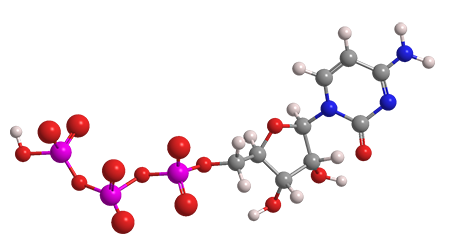What molecule am I?


Cytidine 5′-triphosphate (CTP) is a pyrimidine nucleoside triphosphate that is analogous to the better-known ATP, but with cytidine as the base instead of adenine. It is a substrate in the biosynthesis of RNA.
Triphosphates like CTP and ATP are high-energy molecules; but ATP is involved in many more metabolic reactions than CTP. Now, however, CTP may be useful in the development of new antiviral drugs.
The research groups of biochemists Steven C. Almo at the Albert Einstein College of Medicine (Bronx, NY) and Craig Cameron at Penn State (University Park, PA) discovered that an enzyme expressed in humans catalyzes the dehydration of CTP to produce another triphosphate abbreviated as ddhCTP. The dehydrated species resembles current antivirals that disrupt RNA genome replication in some viruses.
In in vitro experiments, the researchers found that ddhCTP inhibits RNA polymerases in viruses such as Zika, West Nile, dengue, and hepatitis C. In addition to the possibility of developing new antivirals by using this technique, experts predict that this research could open new pathways to drugs based on natural small molecules.
Cytidine triphosphate hazard information
| GHS classification*: acute toxicity, oral, category 4 | |
| H302—Harmful if swallowed | |
| GHS classification: Skin irritation, category 2 | |
| H315—Causes skin irritation | |
| GHS classification: serious eye irritation, category 2A | |
| H319—Causes serious eye irritation | |
| GHS classification: specific target organ toxicity, single exposure; respiratory tract irritation, category 3 | |
| H335—May cause respiratory irritation | |
*Globally Harmonized System of Classification and Labeling of Chemicals. Explanation of pictograms.
Cytidine triphosphate
fast facts
| CAS Reg. No. | 65-47-4 |
| Empirical formula | C9H16N3O14P3 |
| Molar mass | 483.16 g/mol |
| Appearance | White powder |
| Melting point | 215–218 ºC |
| Water solubility | 11.2 g/L |

Learn more about this molecule from CAS, the most authoritative and comprehensive source for chemical information.
Molecule of the Week needs your suggestions!
If your favorite molecule is not in our archive, please send us a message. The molecule can be notable for its current or historical importance or for any quirky reason. Thank you!
Stay Ahead of the Chemistry Curve
Learn how ACS can help you stay ahead in the world of chemistry.

